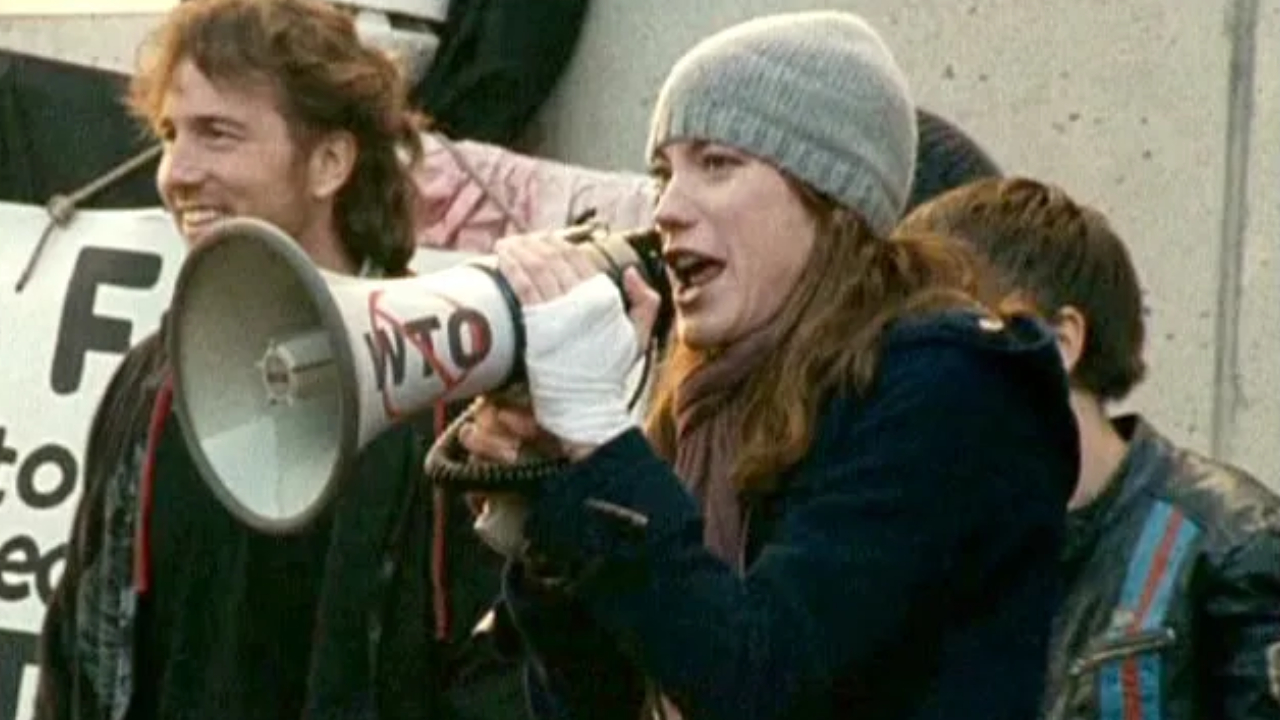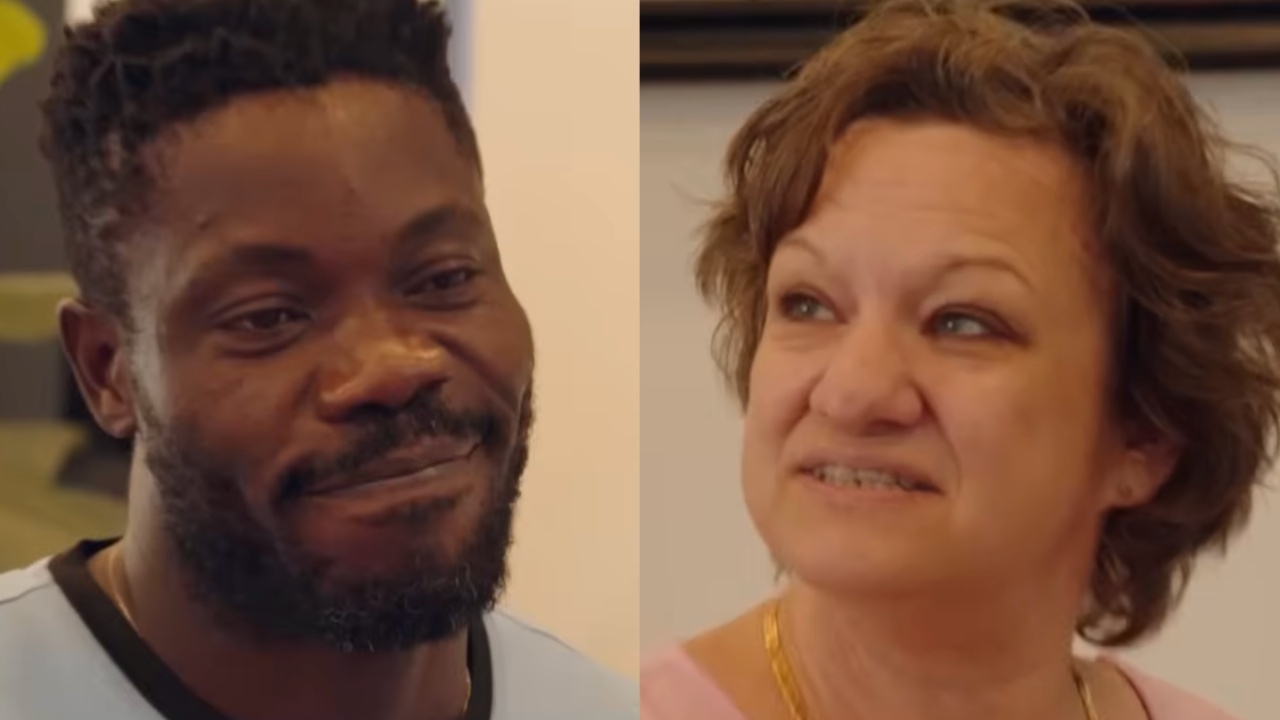Interview: Battle in Seattle Director Stuart Townsend

Though he's famous as an actor, Stuart Townsend is clearly also some kind of egghead. Who else would take it upon themselves to research the entire world's financial system, and then make a movie about it? Townsend's directorial debut dramatizes the riots that surrounded the 1999 World Trade Organization's conference in Seattle, where thousands of demonstrators gathered in the city to protest the organization's policies of free trade that have decimated third world countries nationwide.
Yeah, it's a complicated subject. But Townsend's film is also dramatic and moving, telling the stories of a dozen people who were involved in the demonstrations, from career protesters to random passersby. Townsend talked about the difficulty in bringing the complicated facts of the WTO to the screen, plus the difficulty of shooting riot scenes with tons of extras. Parts of the below interview are from a roundtable discussion, and parts are from an exclusive interview.
What got you interested in globalization?
It started with environmentalism. I was really educating myself on the environment, but I didn't realize it was so connected to politics, connected to globalization. I read a book by Anita Roddick called Take It Personally. It was sort of an idiot's guide to globalization, and I just realized, globalization is at the root of a lot of our modern ills. The Battle in Seattle event was this clear illustration of all those issues, and people fighting against the system. I thought it was pretty cinematic.
Why did you choose this story to tell?
Well, it was visual. The idea was to make an action movie about something. That was my overarching intent. Instead of making a doc that was factual, and maybe a little staid, hiring actors that people-- particularly young people-- [like]. All the girls love Channing Tatum, Andre Benjamin-- everybody loves Andre. That was the plan. To try and get these actors. People love going to the cinema. You can be inspired by cinema and I have been. They might not go see a film about WTO, but they might see a film with Andre Benjamin in it.
How did you research this?
Your Daily Blend of Entertainment News
Just putting in the hours. I spent a year and a half researching the event, and just reading all the books. Just doing all the research from both sides, and making my own opinions. I'm still doing it. Now I'm just interested. Look at two days ago, the financial crisis. That's the same economic system that people were warning against and fighting against. The media acts like it's a shock. People have been waiting for this bubble to burst for a long time. It continually evolves.
How did you shoot the big riot scenes?
My DP gave instructions to his cameramen that there were no mistakes. Don't be afraid to just find moments. The cameramen were just having a great time. People get into it. We'd say "Cut!" and no one would hear us. We'd have to actually do this police siren, so people knew then to stop. It was like "Action!" and everyone just went for it.
Did anybody get hurt?
Surprisingly, no. No deaths. No Werner Herzog [stuff].
Was there a lot that ended up on the cutting room floor?
Yeah. The first cut I did, which was all of the film that I really wanted, it was two hours. We ended up slicing another half hour off of that. We realized that the film is so intense, there's so much going on, that it's exhausting. One second longer, and it's like, my brain's going to fry. I had to leave a good dozen scenes on the cutting room floor.
If you had another $15 million dollars, would the film be different?
It probably would have been a worse movie. It would have been bigger. It's a tricky one. We shot it in 29 days. I honestly would have loved 31 days, and maybe another million bucks. I wouldn't have liked any more than that. That gave it such an intensity. It was like a military operation. There were no divas on set. That energy is great.
What about doing more filming in Seattle, with more money?
I could have filmed all of it in Seattle. The thing is, if someone had given me $45 million, then it was a studio movie. The studios didn't want to make it. Ultimately, this is a Canadian film.
What do you want people to walk away with?
That you can make a difference. It's a people power movie. I think everyone doesn't feel like they're being listened to. Most people feel like they can't make a difference. It was really a diverse collection of regular Americans, who shut down the world's most powerful trade organization. It really made a difference. I think when you're tactical about things, and you join together, you can make a difference, and that's the message.
Does the timing feel particularly good, given this week's financial problems?
I started the film in 2002. I though I would have it finished by 2004. And every year it didn't get made, I thought I missed this amazing, serendipitous event that connected. And then it would happen again and again. There have been so many examples of this failed economic system. Almost every month there's another example. It's hard to connect the dots, but the WTO and globalization I still think are the most important issues. It's more important, and will outlast, wars and anything else. We're always going to trade.
How did you take all this information about the WTO, and this complicated issue, and make it a movie?
That's why I chose the [1999 Seattle protests]. I think the events were a dramatic way to tell the story. There were all these creative protests. They're using their democratic rights that are so important to Americans, and then it all goes wrong. The city just escalated out of control. They started using military gas on civilians. That's a movie! I just though, this is very cinematic. This is very visual. I think you get a sense by the end of the film why people were there. And enough of a sense to know that the WTO is not a democratic institution and is not a good thing.
How did you get into telling the story of the career protesters, who are really the main characters?
There's never been a film that's had them at the center, that's had them as the heroes. There's never been a protest film. This is what I wanted to see on the big screen-- a giant, mass demonstration that then gets out of control. What I'm interested in as a filmmaker is to enter a world that I'd never been in. I think it is a separate world for the majority of people who aren't protesters. Taking over intersections, putting your hands through cement blocks-- that was all new to me. I hoped that an audience like me might be equally fascinated.
Were there any directors who you've worked with that particularly inspired you?
I'd worked with directors who wouldn't collaborate. Then I've also worked with directors who didn't really know what they wanted. I knew I didn't want to be either one of those guys, or girls. Mine was sort of the middle ground. I wanted to be the director who knew exactly what he wanted, but was also willing to collaborate. I think actors have a huge valuable input. As long as you know what you want, then it's very easy to say yes, no, yes, no. Actors want to be told what to do-- they really do. But they also want to have an input, and be recognized for that.
Do you want to stick with acting, keep directing, write more screenplays, or do something new?
I'm developing stuff. There's about four projects that I'm kind of feeling out right now. But always, I love acting. I just wasn't loving it. I wasn't getting any opportunity to just be in films, as an actor, playing good characters that I loved. It was time to take the reins in my own hands. But if anyone out there has any good acting roles they want to give me...
What was it like bringing this to the Democratic and Republican conventions?
People were very polite. I was actually hoping for a little debate-- particularly with the Republicans, who believe in free markets, deregulation, privatization. I was actually really wanting someone to debate me, but no one did. People liked it. I don't think this is a left or right film. It's more about Americans, and patriotism, and a system of injustice. In one sense I was surprised that there weren't more hard-hitting questions. And in another sense I was like "Good." It seemed to reach out further than I thought. It plays everywhere, because essentially it's a film about people.
When I was looking you up online, it was all gossip, paparazzi stuff. Are you just used to it? Does it bother you?
I don't care. It is what it is. I'm not going to feed that beast. It's really nobody's business, but unfortunately we live in a culture of celebrity. you can't get away from it. What you can do is stay out of the spotlight as much as you can. On your days off you just hang out with your mates and have a normal life.
So you're not going to get arrested for punching any paparazzi?
[Sighs] I really hope not. No, it really scares me, because I've already had a few scuffles. And it's hard. And they taunt you, they call Charlize a cunt-- they want you to hit them. And that's really hard. Particularly being an Irishman.
Staff Writer at CinemaBlend

